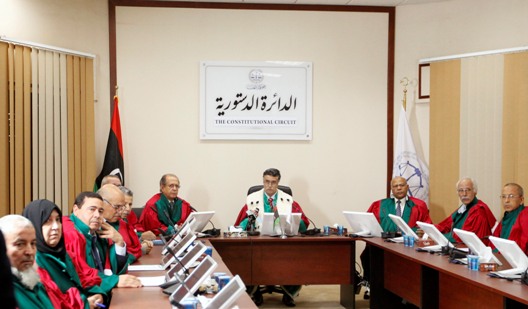Libya Judiciary Divide Deepens as Benghazi Court Rejects Presidency Council Appeals
BENGHAZI, Libya (Oct. 2025) – Libya’s Benghazi Court of Appeal issued rulings in mid-October stating that it has no jurisdiction to hear appeals of decrees issued by the country’s Tripoli-based Presidency Council. In two cases, the court said it could not consider legal challenges to council orders. The contested decrees included the April 2025 Presidential Council decree suspending House of Representatives Law No. 5 of 2023 – a deeply contested law establishing a new constitutional court – and a decree calling elections for a General Conference on National Reconciliation in Sirte. In each instance, the Benghazi court dismissed the appeal on grounds of lack of jurisdiction.
Divided Judiciary and Contested Authority
Since the 2011 uprising that overthrew Muammar Gaddafi, Libya has experienced a political landscape marked by volatility, with authority divided between an internationally recognized government based in Tripoli and rival administrations in the country’s east. Efforts to unify state institutions and hold national elections have repeatedly stalled amid security challenges, political rivalries, and disputes over constitutional rules, prolonging the country’s instability. Scheduled national elections have repeatedly stalled or collapsed, deepening those divisions. The country’s judicial system is similarly fractured. Last year, the eastern House of Representatives created its own Supreme Constitutional Court in Benghazi, establishing a parallel institution to the Tripoli Supreme Court’s constitutional chamber. As a result, Libya now has competing legal bodies and conflicting rulings that raise the risk of a constitutional crisis.
Formally, Libya’s Tripoli-based Presidency Council is meant to serve as a collective head of state under the UN-backed 2015 political agreement. It is led by a chairman and two vice-chairmen representing Libya’s three historical regions. The council has been tasked with guiding national reconciliation and preparing elections. But its authority has often been contested. In April 2025, the Presidency Council unilaterally issued Decree No. 1 of 2025, which suspended all effects of the House of Representatives’ Law No. 5 of 2023, on the grounds that a Constitutional Chamber had ruled the law unconstitutional. It also issued other decrees to organize a national reconciliation conference and related referenda. Even among council members, there has been disagreement: one vice chairman, Abdullah al-Lafi, publicly declared that any “unilateral declaration” by the council without full consensus would be null and void. These clashes over authority have left Libya with rival decrees and no clear legal mechanism to reconcile them.
Governance Implications and Decentralization
Benghazi Court’s rulings underscore how divided authority can undermine legal oversight. By declaring that presidential decrees are beyond its jurisdiction, the court is effectively saying that these decisions cannot be challenged in the eastern judiciary. In Libya’s context of dual power centers, the effect is to insulate the Tripoli executive from local judicial review. Observers have warned that Libya’s split system already creates conflicting rulings and risks legal chaos. With these new appeals barred, anyone in eastern Libya affected by a Presidency Council decree will have limited recourse. In effect, the rulings highlight an erosion of checks and balances: an order from the Presidency Council now stands virtually unreviewable in the east.
For governance, the timing is notable. Libya has been experimenting with decentralization even as national politics stall. The country’s electoral commission announced it would resume dozens of municipal elections on Oct. 20, 2025, covering local councils in many towns. That move came in the midst of a prolonged stalemate: planned national presidential and parliamentary elections collapsed in 2021 and have not been revived. In this environment, local authorities must navigate overlapping mandates. If eastern courts refuse to overturn decrees from the Tripoli government, local councils and officials may confront contradictory guidance from national leaders and local power brokers. Ultimately, analysts note that Libya’s national dialogue identified decentralization and local governance as key issues to address – but without unified institutions and clear legal paths, efforts to empower local governance may be undercut by unresolved legal battles at the top.
Benghazi’s appeal court judgement puts into sharp relief the fragility of Libya’s post-2011 order. The absence of judicial checks on controversial decrees adds another layer of uncertainty to an already complex landscape. For now, the authority of the Presidency Council’s pronouncements may depend less on the rule of law and more on shifting political power. Legal experts fear that a decree without remedy is tantamount to arbitrary rule – the very outcome Libyans had hoped to avoid when building new institutions after the revolution.




